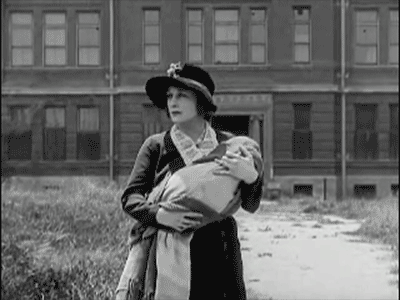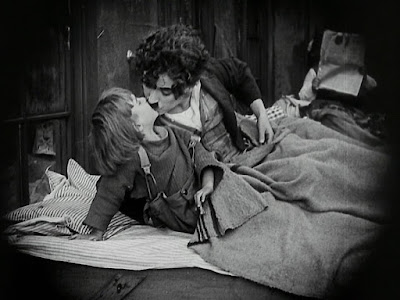USA/Comedy-Drama/Silent/B&W
Directed,Written,& Produced by:
Charles Chaplin
Directed,Written,& Produced by:
Charles Chaplin
Cast:
Charlie Chaplin...The Tramp
Jackie Coogan...The Child ("John")
Edna Purviance...The Woman
Carl Miller...The Man
Tom Wilson...The Policeman
Henry Bergman...Night Shelter Keeper/Professor Guido
Charles Reisner...Neighbourhood Bully
Raymond Lee...Bully's Little Brother
Lita Grey...Flirtatious Angel
Jules Hanft...Country Doctor
Frank Campeau...Welfare Officer
F. Blinn...Welfare Officer's Assistant
Jack Coogan, Sr.(father of Jackie Coogan)...Pickpocket/Guest/Devil
Esther Ralston...Extra in the Heaven Scene
Granville Redmond...The Man's friend
May White...Edna's maid
Silas Hathaway...Infant The Kid
Albert Austin...Man in Shelter/The Car Thief
An unwed mother writes a note and leaves it with her child to be found by wealthy people and give it a chance for a better life, but when things go awry, The Tramp inadvertently stumbles across the abandoned baby. Initially he tries to give the waif away, but then reads the note and decides to raise the child as his own. As the years go by, life is simple and happy, but the authorities have different ideas.
Before the creation of United Artists, Chaplin married for the first time. The 17-year-old actress Mildred Harris had revealed that she was pregnant with his child, and in September 1918, he married her quietly in Los Angeles to avoid controversy. Soon after, the pregnancy was found to be a false alarm. Chaplin was unhappy with the union and, feeling that marriage stunted his creativity, struggled over the production of his film Sunnyside. Harris was by then legitimately pregnant, and on 7 July 1919, gave birth to a son. Norman Spencer Chaplin was born malformed and died three days later. The marriage eventually ended in April 1920, with Chaplin explaining in his autobiography that they were "irreconcilably mismated".
Losing a child is thought to have influenced Chaplin's work, as he planned a film which turned the Tramp into the caretaker of a young boy. For this new venture, Chaplin also wished to do more than comedy and, according to Louvish, "make his mark on a changed world."
Charles Chaplin decided to make a film around Jackie Coogan after seeing him in a vaudeville performance with his father Jack Coogan Sr.. The elder Coogan essentially put his career on hold to coach little Jackie through filming. Chaplin, in turn, rewarded Jack Sr.'s role in coaching the boy, as well as assuaged his performer's ego, by paying him $125 a week, almost double the $75 a week Jackie was getting to co-star. Jack Sr. also played several roles in the film, as a bum who picks the Tramp's pocket, as the Devil in the Heaven sequence and as a party guest.
For the scene in which the Kid is taken from the Tramp and nearly carted away to a workhouse, Charles Chaplin stated in his autobiography that the young Jackie Coogan was made to cry by his father, who told him that if he would not cry in the scene, he would be sent to an actual workhouse.
An unwed mother writes a note and leaves it with her child to be found by wealthy people and give it a chance for a better life, but when things go awry, The Tramp inadvertently stumbles across the abandoned baby. Initially he tries to give the waif away, but then reads the note and decides to raise the child as his own. As the years go by, life is simple and happy, but the authorities have different ideas.
Before the creation of United Artists, Chaplin married for the first time. The 17-year-old actress Mildred Harris had revealed that she was pregnant with his child, and in September 1918, he married her quietly in Los Angeles to avoid controversy. Soon after, the pregnancy was found to be a false alarm. Chaplin was unhappy with the union and, feeling that marriage stunted his creativity, struggled over the production of his film Sunnyside. Harris was by then legitimately pregnant, and on 7 July 1919, gave birth to a son. Norman Spencer Chaplin was born malformed and died three days later. The marriage eventually ended in April 1920, with Chaplin explaining in his autobiography that they were "irreconcilably mismated".
Losing a child is thought to have influenced Chaplin's work, as he planned a film which turned the Tramp into the caretaker of a young boy. For this new venture, Chaplin also wished to do more than comedy and, according to Louvish, "make his mark on a changed world."
Charles Chaplin decided to make a film around Jackie Coogan after seeing him in a vaudeville performance with his father Jack Coogan Sr.. The elder Coogan essentially put his career on hold to coach little Jackie through filming. Chaplin, in turn, rewarded Jack Sr.'s role in coaching the boy, as well as assuaged his performer's ego, by paying him $125 a week, almost double the $75 a week Jackie was getting to co-star. Jack Sr. also played several roles in the film, as a bum who picks the Tramp's pocket, as the Devil in the Heaven sequence and as a party guest.
For the scene in which the Kid is taken from the Tramp and nearly carted away to a workhouse, Charles Chaplin stated in his autobiography that the young Jackie Coogan was made to cry by his father, who told him that if he would not cry in the scene, he would be sent to an actual workhouse.
The off-screen chemistry between Charles Chaplin and Jackie Coogan was just as strong as their onscreen relationship. Every Sunday, during the first few weeks of filming, Chaplin would take Jackie to amusement parks and pony rides and other activities. Some have seen Chaplin's relationship with Coogan as an attempt for Chaplin to reclaim his own unhappy childhood, while others have interpreted Chaplin's attention toward the boy as recasting Coogan into the child he had just lost.
Filming on The Kid began in August 1919, with four-year-old Jackie Coogan his co-star. It occurred to Chaplin that it was turning into a large project, so to placate First National, he halted production and quickly filmed A Day's Pleasure. The Kid was in production for nine months until May 1920 and, at 68 minutes, it was Chaplin's longest picture to date. Dealing with issues of poverty and parent–child separation, The Kid is thought to have been influenced by Chaplin's own childhood and was one of the earliest films to combine comedy and drama. It was released in January 1921 with instant success, and, by 1924, had been screened in over 50 countries.














No comments:
Post a Comment